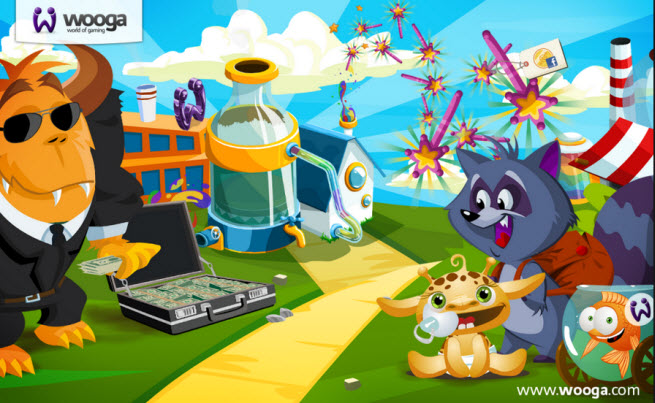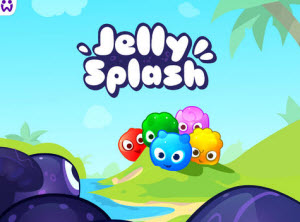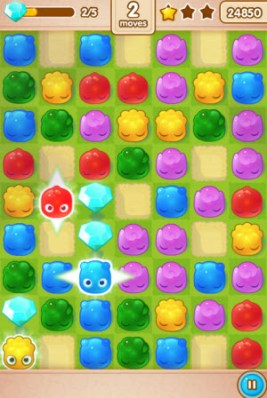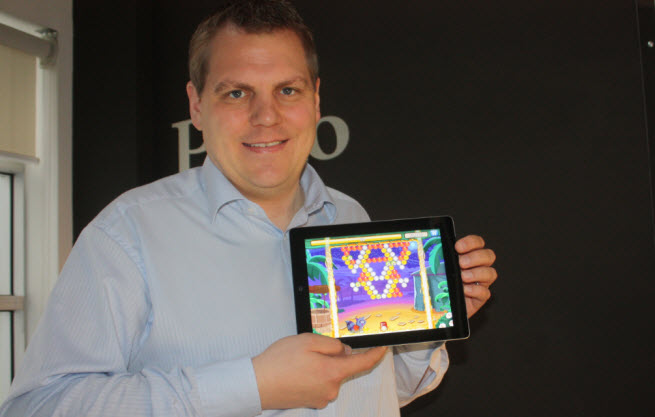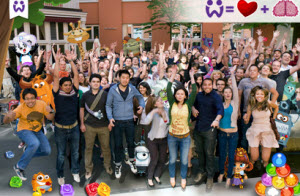Wooga is one of many social-game companies trying to break into mobile. In the past eight weeks, it found its way with Jelly Splash, a color-tile matching game with more than 10 million downloads in eight weeks on iOS.
Jens Begemann, chief executive of Berlin-based Wooga, talked about how much effort went into making Jelly Splash — launching today on Android — which has some unique riffs on games like Candy Crush Saga, Bejeweled, and Dots.
We sat down with Begemann for an interview in San Francisco last week. Here is a transcript of our talk.
GamesBeat: So what’s new at Wooga?
Jens Begemann: We launched a game eight weeks ago, Jelly Splash. It reached number one on the free charts at the App Store for a number of days. It’s now a top-20 grossing game in the U.S. and a dozen other countries. It’s continuing to grow fast. We’re over 10 million downloads now. We’ve also recently launched it on Facebook, and on Monday we’re launching on Android.
GamesBeat: How long did you work on that one?
Begemann: That was roughly a year. It’s relatively simple gameplay, but these simple games — easy to learn, hard to master — those are the most difficult to tune. It has some similarities to games like Candy Crush Saga. We created this map in 2010 for a game called Bubble Island. Then, it was taken over into other games.
The gameplay is very simple. You draw lines and connect these jellies, jellies of the same color. … It’s a bit like Dots, but it’s a level-based game, and you can also go diagonally. … It’s very simple. You just play until you have enough points. But it becomes more complex. If you go back to the map, you can choose a harder level. … We have more than 180 levels, where the objectives constantly change.
It’s become very popular all over the world. We had only an eight-week delay to get it on iOS, Facebook, and Android, which I think is much faster than most people have done it, and we’re already at 10 million downloads. It’s definitely our biggest launch so far.
The other thing we’re talking about is our strategy and how we see Wooga. We continue to be profitable, and we’ve roughly doubled our revenue each year. Revenue is currently 70 percent higher than it was last year. The market is consolidating. It’s much more about hits on mobile now. The key, for us, is to repeatedly bring out hits. We don’t just want to do one hit and live off it.
You can ask, then, what’s a hit? How do you define a hit? To us, it’s a game that does tens of millions of dollars in revenue across its lifetime. We’ve been on the market for four years, and by that standard, we’ve had five hits so far. Bubble Island was the first one, then Monster World, Diamond Dash, Pearl’s Peril, and now Jelly Splash has not yet crossed that $10 million mark, but it will soon. We’re quite happy with that.
Our goal is to create two to three more hits every year. We’ve changed our development approach quite a bit this year.
GamesBeat: How many people do you have now?
Begemann: More than 250 now. A bit more. We’re still growing. We’ve tried to grow a bit slower. We see that really small teams are the way to go. We have a few people in service areas and overarching corporate functions like PR or marketing or finance or customer care, but about 200 of those work in the game teams. We have 20 different game teams. Some of those are very small, maybe three people prototyping something, and some are bigger. But they’re very small teams where everyone has a big impact.
We continue to grow the headcount, but we don’t want to grow crazily. We believe that small teams of the right people represent the best way to go.
GamesBeat: We haven’t talked much since Clash of Clans and Puzzle & Dragons took over the market. What do you think of those developments?
Begemann: They’re crazy successful. Our goal is to regularly create hits, though. If you have that, you can finance lots of other titles. With a game that’s designed to create tens of millions of dollars, if the right things come together — timing and the market — it can become much bigger. That’s what’s happened with Clash of Clans and Gung Ho, a game that was a hit became huge — a super hit, you might call it.
GamesBeat: We talked to former Electronic Arts CEO John Riccitiello recently. He was saying that when you’re in the console space, what you want are the $10 billion properties. The brands aren’t really big until they’ve been around for five or 10 years. He was saying, well, how many people think Angry Birds will be in the top five, say, five years from now?
Begemann: Free-to-play games are services. You run them constantly, and they generate revenue every day. Even during the Christmas holidays, even on weekends, they generate revenues. The usage is very different. Something like GTA or Call of Duty, every year or every couple of years it gets a heavy increase in usage, and then it goes down again. In free-to-play games, it’s constant. To me, that’s worth even more.
If you look at the total revenue that a Clash of Clans has generated so far, it’s still probably smaller than Call of Duty, but it’s not so far away. One of these two markets is growing fast. One of these two business models is growing fast. You have to embrace the future. If you look backward too much, looking at what’s happened in the last 10 or 20 years, you won’t be successful in the next 10 years.
GamesBeat: We’ve seen some free-to-play games end their life. Zynga’s discontinued a lot of titles. Kabam’s discontinued a few. Is that something you’ll expect every game company to have to deal with?
Begemann: We’re very much embracing the notion of stopping projects. But we stop most of them before launch. We do many, many prototypes, and we move about 15 games into production every year. Every four months, we challenge and question each project. Should we continue working on this? That leads us to stop a lot of projects. If we don’t think a game has the potential to become a hit, the team works on something else. But then, when we launch, we work hard on making each game a hit. If it’s a hit, it justifies having a team on it for many years.
We have Monster World, which we launched more than three and a half years ago. There’s still a team on it, with a new version every week. We’re really happy with that. Maybe, at some point in the future, we’ll move that team to something else. But for us, it’s about sustainable long-term growth. Even if you move a team to something else, you can still keep the game online. We had one game some time ago where we switched it off, but at that point it had about as many users as you see in this room [Laughs]. We believe that as long as a game has lots of fans, you shouldn’t disappoint them. You should at least keep the service running.
GamesBeat: How large do your teams get with each game?
Begemann: A team starts with just two or three people making a prototype. At launch it’s between 10 and 15. Post-launch, for a successful game, it can be 15 or 20 people. That’s a typical size. We have some games that are online, but we don’t have a live team working on them. Other games, like Monster World or Diamond Dash, have teams constantly working to improve them every week.
GamesBeat: Have you considered something like the 80-person team at Machine Zone, where they worked for 18 months to come up with Game of War?
Begemann: We were moving in a direction where teams were getting larger. Pearl’s Peril, our hidden-object game, that became about 30 people at some point. That was becoming too big. The communication overhead was quite big. It was not agile enough or innovative enough. So we prefer to keep the teams smaller.
Timeline-wise, from prototype to launch, it’s still a year. It can be more than that, up to 18 months. But I think the teams should be small. If we need to add lots of graphics, sometimes we’ll work with external partners to deliver more content. But we try to keep the core team inside the company to 15 people or less.
GamesBeat: Do you consider your transition to mobile successful, then?
Begemann: Very much for us. Two years ago our mobile revenue was zero. It was all Facebook. Our Facebook business is still going well, but mobile is growing so fast that it’s now more than half of our revenue. With the Android launch of Jelly Splash next week, we may be ready to announce a new benchmark in terms of mobile share toward the end of the year.
GamesBeat: You guys had an HTML5 game that you canceled. Do you still feel the same way about HTML5?
Begemann: Yes. The challenge on HTML5, it’s two things. One is on a technological level. Users are demanding an excellent experience in terms of response time and how smooth everything feels. In many cases they expect the game to work offline. That’s possible with HTML5, but more difficult. Getting that cross-platform is tough.
The second thing is that the behavior of users is different. On the PC, most people only have one app running. That’s their browser. They’re happy with switching from one website to another and entering websites. On mobile, a number of users rarely open their browser. They’re hopping from one app to another. What people want is an icon on their device, and they’ve learned that how you get that icon on your device is through the App Store or Google Play. The learned user experience is very much about apps. Using HTML5 in the browser goes against what users have learned. It makes adoption much harder.
GamesBeat: How do you look at the rest of the mobile landscape and whether all these mobile game studios are healthy or not? Is everyone collectively benefiting from a larger market?
Begemann: The whole market is in a big transition. It’s even broader than just inside mobile. If you look at console and browser, everything is changing. Looking at mobile, we’ve run some numbers and done some estimations. About 40,000 new games launch every year on iOS and about the same number on Google Play. Not quite a thousand a week. By our definition of a hit, I’m not completely sure on this, but it seems like about .2 percent of games cross that threshold. No more.
Some companies are benefiting a lot and are extremely successful. Many others struggle to earn their development costs back. From what I hear, most companies don’t make their money back. But a few are super successful. This leads, I think, to consolidation. That will happen over the next few years.
That’s why we’ve put so much focus this year on creating this development funnel where we repeatedly produce hits. About 15 prototypes a year go into production. Five launch. Two to three become hits. This year, that’s been Pearl’s Peril and Jelly Splash so far, and the year’s not over. I’m optimistic for what’s coming next.
GamesBeat: Have you thought about doing things like some of your competitors and going into third-party publishing?
Begemann: If the right game comes along, we would publish it. Our core focus is still being a developer and creating games, but we’re open to that. We’re talking to independent developers about it.
GamesBeat: But you’re not necessarily seeding those kinds of companies.
Begemann: No. We’re not an investor. If an independent developer is there and they say they want the marketing power and the distribution power and the reporting systems and the ability to localize that we have, then we can help them with that. We wouldn’t finance development.
GamesBeat: Are we on the cusp of globally appealing games? Angry Birds kind of ran out of gas in that respect. Do you think that you actually need to design a global game?
Begemann: It’s a very interesting question. We have seen games like Diamond Dash become successful all over the world, except in Japan, Korea, and China. And we’ve seen a lot of games that are only successful in east Asia. There’s still this chasm, if you want to call it. Japan, Korea, and China work differently. That’s something we’re watching very carefully.
We design our games more for the rest of the world. We don’t design our games specifically with Korea or Japan in mind. But we look at everything. We have a very international company. More than 40 nationalities work for Wooga in the same office in Berlin. Every team is very international too. So, they don’t create a game that’s just German or American or whatever. We create games that fit a global taste.
A few years back, people said that things like free-to-play would only work in Asia, and they’d never work in the West. But they’ve made the transition. That will be something to watch in the next few years. Will these markets come together, or will they still stay separate?
GamesBeat: What do you think of mobile-messaging networks like Kakao and Line and WeChat? Do you think they’ll catch on elsewhere in the world?
Begemann: We watch those platforms very closely. They’re extremely interesting. We may have something to announce on that. In terms of the messaging platforms, they’re separated by country. Line dominates Japan. You have WeChat in China and Kakao in Korea. To a smaller degree, What’s App is strong in Europe. It’s replaced text messaging for many people.
These platforms can be an additional distribution channel. It’ll be interesting to see if they unify or remain separated from market to market. We’ll see how they compete against each other. To us, when it’s right, it could be an interesting additional distribution platform.
VentureBeat's mission is to be a digital town square for technical decision-makers to gain knowledge about transformative enterprise technology and transact. Learn More
